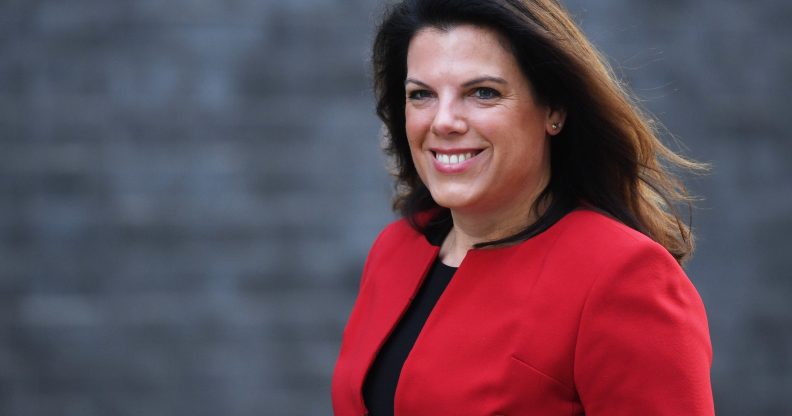NHS gender clinics need to be ‘scrapped entirely’ as part of urgent trans healthcare reform, MPs told

Caroline Nokes, chair of the Women and Equalities select committee. (Leon Neal/Getty)
The system of NHS gender clinics that provide transgender healthcare in the UK should be abolished and hormones should be made available from GPs, MPs have been told.
“We think Gender Identity Clinics, as a concept, should be removed and that access to healthcare like hormone treatment can be made through primary care,” Dr Harriet Hutchinson, a community organiser with Action for Trans Health Durham, told a meeting of the Women and Equalities Select Committee on Wednesday (12 May).
She added: “People should have the right to make the changes to their body that they want to. Fundamentally, it is wrong that the psychiatric profession gets to decide whether or not we are who we say we are.”
MPs were hearing expert evidence on trans healthcare and NHS gender clinics as part of the committee’s inquiry into the reform of the Gender Recognition Act – which was scrapped by Tory equalities minister Liz Truss in September 2020, despite overwhelming public support for streamlining and demedicalising the process.
Hutchinson told the committee, chaired by Tory MP Caroline Nokes, that NHS gender clinics have “a history of gatekeeping, of excluding us, of discriminating against us, and deciding whether or not we are who we say we are”.
The system of NHS gender clinics is “wrong” and “they need to be scrapped entirely”, Hutchinson said.
“Pouring money into Gender Identity Clinics will not solve the problem,” she continued. “The way trans identity is conceptualised institutionally limits trans people’s access to healthcare.
“The government should be pushing for complete reform of the processes involved, a change to the understanding of trans identity and how that relates to things like the Gender Recognition Act, improving access to mental health services and making sure provision is sufficient to deal with the needs of trans people as well.”
There are seven NHS gender clinics in England and Wales, providing trans healthcare – including speech therapy, hormone therapy, counselling and referrals for gender-affirming surgery – for an estimated population of 200,000 to 500,000 people.
Waiting times for a first appointment at a gender clinic, which the NHS constitution mandates should be no longer than 18 weeks, varies from three to five years in different parts of the country. The long waits exacerbate poor mental health among trans people and mean many trans people crowdfund to pay for private treatment, travel abroad, or obtain hormones illegally.
Dr John Chisholm CBE, chair of the Medical Ethics Committee at the British Medical Association (BMA), told MPs yesterday that the long waiting times for trans healthcare are “entirely contrary to the ethos of the NHS, which is to provide people with timely care when they need it”.
He added that he agreed with Hutchinson, and as well as “substantially more capacious” healthcare services for trans people the system of NHS gender clinics should be reformed.
He said: “Specialist prescribing could be facilitated through the electronic prescription service, or properly funded shared care arrangements with GPs who’ve agreed to provide, or in primary care.”
Chisholm added the the BMA’s position is that the process of legal gender recognition for trans people should be separated from trans healthcare, and that there should be no requirement for trans people to be diagnosed with gender dysphoria before being able to have their gender legally recognised.

